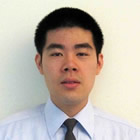2011 Winning Essay!
What excites you the most about your field of study, and what insights from your personal life and/or childhood would you bring to your chosen curriculum?

Eugene Chang
2011 WinnerMary stumbled through the doors of the Emergency Department (ED), her stride hampered by the weight of her unborn child and her right eye swollen with a dark bruise, remnants of a morning argument gone terribly wrong. I reacted quickly, scrambling from my desk to help her into a wheelchair and calling the RN over. Tears crept down her cheek as frantic words poured from her mouth, her lips quivering with each syllable; she was 6 months pregnant, she had been hit, and she was now worried about her baby and didn't know what to do.
I listened quietly, assessing the situation and providing tissues for her tears. The RN decided to send her to pediatrics and I volunteered to escort her there. As I pushed her along the corridors, we spoke a little and I did my best to reassure her and make her day just a little better with a smile. When we arrived at the 4th floor, the pediatrics RN greeted us and I took Mary into a room. As I left, she weakly thanked me with her lips curling to a faint smile that revealed her dimples. It was a wonderful feeling to help her that day and as I worked longer in the ED, I encountered more patients; each with different stories.
These experiences shaped my view on the importance of empathy as a healthcare practitioner. It is through experiences like these that I have come to understand why I want to be a physician-scientist. Medicine is an interesting paradox as on one hand it is one of the most objective forms of knowledge; by nature science is devoid of emotions and driven by empiricism. On the other hand, medicine is also the most subjective: living, suffering, healing, and dying are the most basic and emotional elements of human existence. Before volunteering in the ED, I became interested in medicine through my medical research experience. I enjoy the cerebral challenge of examining a disease and systematically deducing its pathology through experiments. The translational relevancy of how the activity protein X can relate to the prognosis of patient Y has made me interested in figuring out how to apply my work into solutions for clinical problems. When I observed Dr. Alexis examine heart failure patients, I realized that there are many similarities between the hypothesis-driven research skills of a scientist and the differential diagnosis skills of a physician. A physician must diagnose in an objective manner for the best care but also carefully balance his opinion to respect the subjective feelings of the patient and his loved ones.
This interplay between the empirical and emotional aspects of human nature is what attracts me to medicine and science the most. Clinical experiences in the ED and cardiology have shown me that medicine is more than the science of healing; it also encompasses the intangible elements of humanity and compassion. For example, during those Sundays in the ED I loved interacting with patients and their families in the waiting room, joking with them about the NFL games or just chatting. I also enjoyed observing patient care with Dr. Huang as he gave consultations in the clinic, performed ablations for arrhythmia, and visited patients during rounds because it was amazing to witness the healing process. I was impressed by Dr. Huang's excellent bedside manners; the way he spoke to each patient in a reassuring and sincere way was inspirational and is a template for how I would like to interact with my own patients in the future. Clinical observation has also demonstrated to me that medical research can do more than sate my curiosity; in many cases I believe it expands the frontiers of current diagnostics and treatments for cardiovascular disease (CVD). Many patients come to the ED feeling severe chest pain and shortness of breath, classic symptoms for MI. Patient mortality after MI is extremely high if not treated rapidly so improving therapies for CVDs from research can ultimately benefit patients. Drugs like beta-blockers have many adverse effects so improving their specificity through an understanding of CVD molecular mechanisms is critical in tailoring unique treatments for patients. I hope that as a physician-scientist, my research in atherosclerosis and heart failure will one day be critical to developing new therapies or diagnostics for improved CVD patient outcomes.
My experiences in science and medicine have convinced me to seek a profession where a love for science and a love for people can merge. Having worked in a CVD lab, I can easily translate my research endeavors into a better understanding of treatments for CVDs. My training in signal transduction has allowed me to understand the intricacies of pathological mechanisms that are valuable to a cardiologist. Ten years from now, my goal is to continue on this path to become a physician-scientist and fulfill the unique niche that bridges the bedside to the bench by blending the compassionate clinical skills of a physician with the methodical basic science skills of a scientist. Ultimately, having a MD will give me new opportunities that were limited with only a PhD.
As a MD/PhD I will have insight into clinical problems that can be solved through my research solutions. To me a career as a physician-scientist is a journey and I believe my life experiences have truly prepared me for the challenges ahead in medicine.

